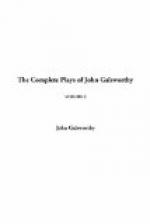Chief humble-man. [In an attitude of expectation.] This is the larst of it, sir.
Wellwyn. Oh! Ah! yes!
[He gives them money; then something seems to strike him, and he exhibits certain signs of vexation. Suddenly he recovers, looks from one to the other, and then at the tea things. A faint smile comes on his face.]
Wellwyn. You can finish the decanter.
[He goes out in haste.]
Chief humble-man. [Clinking the coins.] Third time of arskin’! April fool! Not ’arf! Good old pigeon!
Second humble-man. ’Uman being, I call ’im.
Chief humble-man. [Taking the three glasses from the last packing-case, and pouring very equally into them.] That’s right. Tell you wot, I’d never ’a touched this unless ’e’d told me to, I wouldn’t—not with ’im.
Second humble-man. Ditto to that! This is a bit of orl right! [Raising his glass.] Good luck!
Third humble-man. Same ’ere!
[Simultaneously they place their lips smartly against the liquor, and at once let fall their faces and their glasses.]
Chief humble-man. [With great solemnity.] Crikey! Bill! Tea! .....’E’s got us!
[The stage is blotted dark.]
Curtain.
THE END
THE MOB
A Play in Four Acts
PERSONS OF THE PLAY
Stephen more, Member of Parliament
Katherine, his wife
Olive, their little daughter
the Dean of stour, Katherine’s
uncle
general sir John Julian, her father
captain Hubert Julian, her brother
Helen, his wife
Edward Mendip, editor of “The Parthenon”
Alan steel, More’s secretary
James home, architect
|
Charles Shelder, Solicitor
|A deputation of More’s
mark wace, bookseller
|constituents
William Banning, manufacturer
|
nurse Wreford
Wreford (her son), Hubert’s orderly
his sweetheart
the footman Henry
A doorkeeper
some black-coated gentlemen
A Student
A girl
A mob
Act I. The dining-room of More’s town house, evening.
Act II. The same, morning.
Act III. Scene I. An alley at the
back of a suburban theatre.
Scene
II. Katherine’s bedroom.
Act IV. The dining-room of More’s house, late afternoon.




